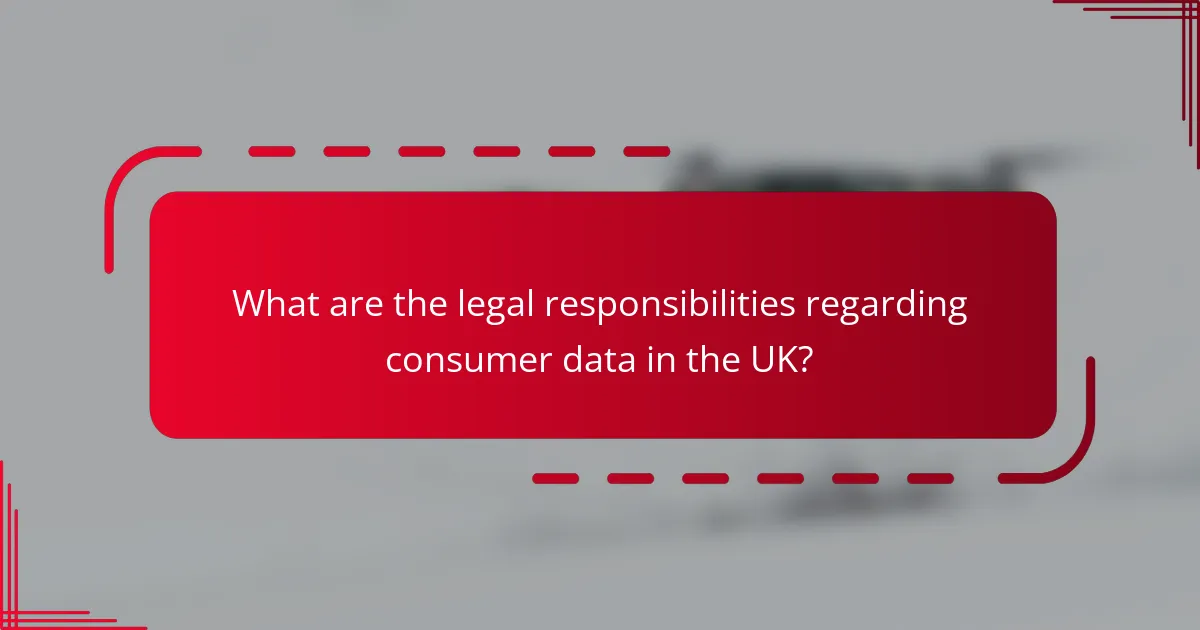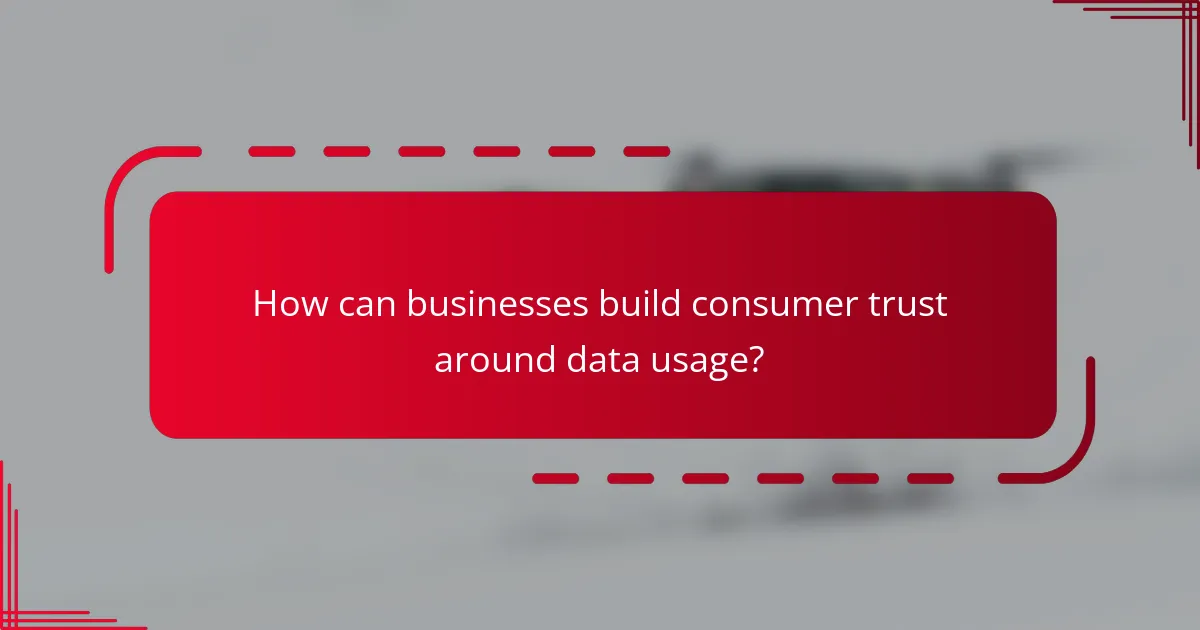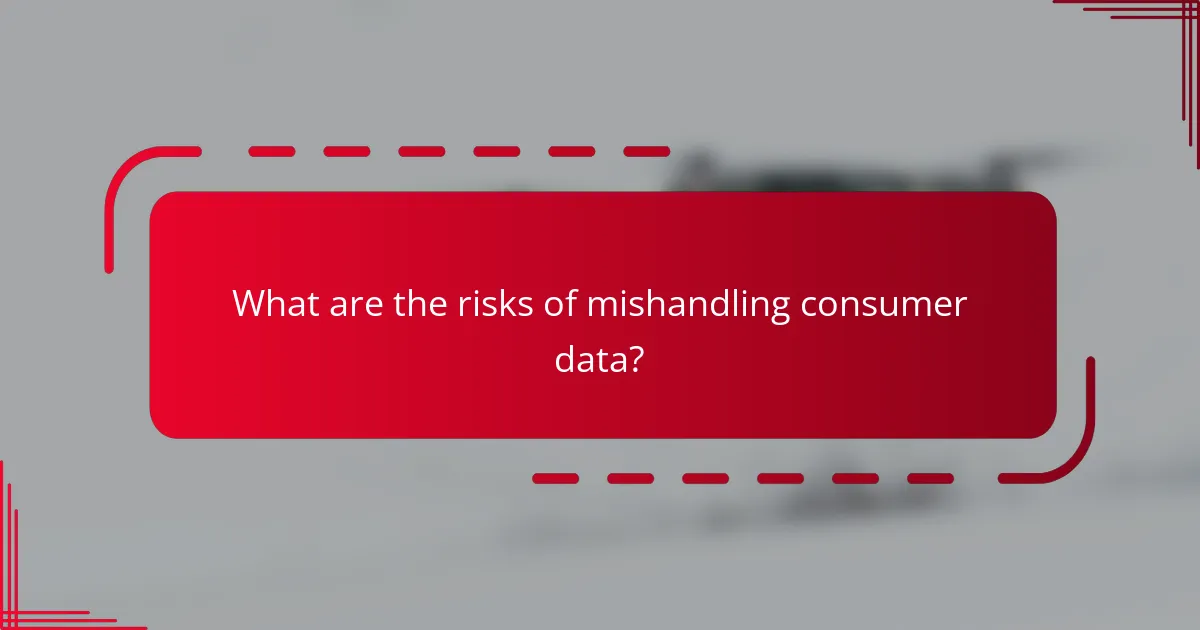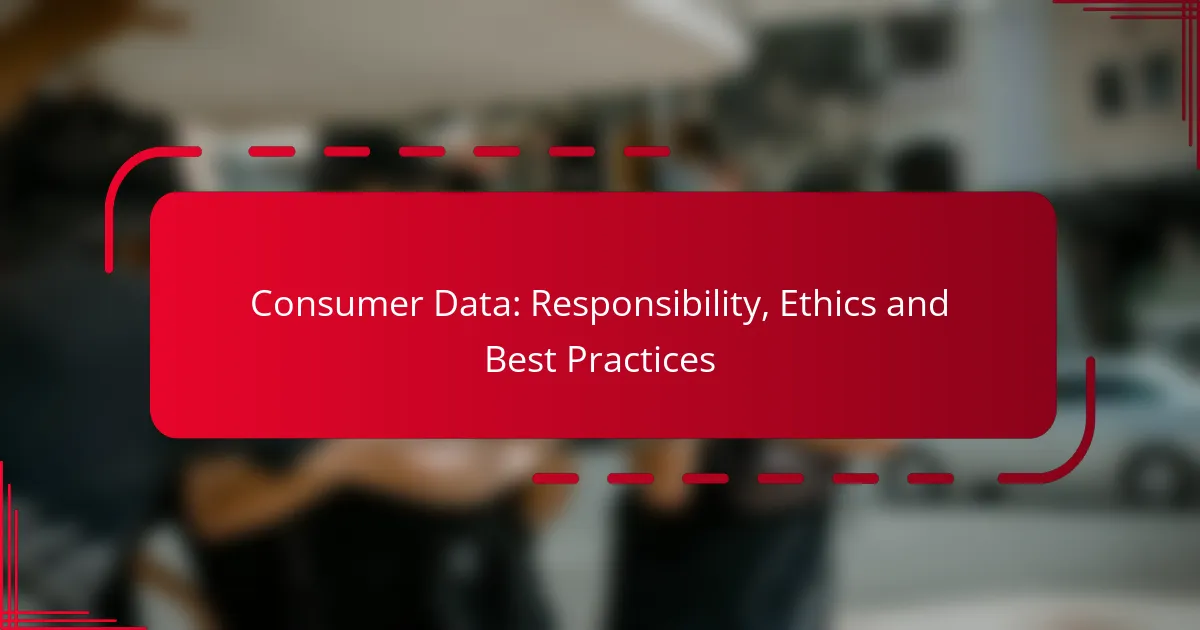In today’s digital landscape, managing consumer data responsibly is crucial for maintaining trust and compliance with regulations such as the UK General Data Protection Regulation (GDPR). Organizations must adopt best practices that prioritize data minimization, transparency, and regular audits to safeguard personal information. By establishing clear guidelines and respecting user consent, companies can ensure ethical use of consumer data while upholding individuals’ privacy rights.

What are the best practices for consumer data management in the UK?
Best practices for consumer data management in the UK focus on protecting personal information while ensuring compliance with regulations like the UK General Data Protection Regulation (GDPR). Organizations should prioritize data minimization, transparency, and regular audits to maintain trust and accountability.
Data minimization principles
Data minimization involves collecting only the information necessary for a specific purpose. Organizations should assess their data needs regularly and eliminate any unnecessary data collection to reduce risk. For example, if a business only requires an email address for communication, it should not ask for additional personal details.
Implementing data minimization can also streamline operations and enhance consumer trust. By clearly defining what data is essential, companies can avoid potential breaches and ensure compliance with privacy regulations.
Transparency in data usage
Transparency in data usage means clearly informing consumers about how their data will be used, stored, and shared. Organizations should provide straightforward privacy notices that outline data practices in plain language. This builds trust and helps consumers make informed decisions about their data.
Regularly updating privacy policies and communicating any changes is crucial. Companies should also offer easy access to data requests, allowing consumers to see what information is held about them and how it is being utilized.
Regular audits and compliance checks
Conducting regular audits and compliance checks is essential for ensuring adherence to data protection laws. Organizations should schedule these audits at least annually to assess their data management practices and identify any areas for improvement. This proactive approach helps mitigate risks associated with data breaches.
During audits, companies should review data handling processes, employee training, and security measures. Establishing a checklist for compliance can help streamline this process and ensure that all aspects of data management are covered effectively.

How can companies ensure ethical use of consumer data?
Companies can ensure ethical use of consumer data by establishing clear guidelines, maintaining transparency, and prioritizing consumer privacy. This involves implementing practices that respect user consent and data protection regulations.
Implementing ethical guidelines
Establishing ethical guidelines is crucial for companies handling consumer data. These guidelines should outline acceptable data collection, storage, and usage practices, ensuring compliance with regulations like GDPR or CCPA. Regularly reviewing and updating these guidelines helps adapt to changing legal landscapes and consumer expectations.
Companies can create a framework that includes principles such as data minimization, purpose limitation, and transparency. For instance, only collecting data necessary for specific services and informing consumers about how their data will be used fosters trust and accountability.
Training staff on data ethics
Training staff on data ethics is essential for cultivating a culture of responsibility within an organization. Employees should understand the importance of ethical data use and the potential consequences of mishandling consumer information. Regular training sessions can reinforce these principles and keep staff updated on best practices.
Practical training can include case studies, role-playing scenarios, and discussions on ethical dilemmas related to data usage. Providing resources such as a data ethics handbook can serve as a quick reference for employees, helping them navigate complex situations effectively.

What are the legal responsibilities regarding consumer data in the UK?
In the UK, businesses must comply with data protection laws, primarily the General Data Protection Regulation (GDPR) and the Data Protection Act 2018. These regulations outline how consumer data should be collected, processed, and stored, ensuring individuals’ privacy and rights are protected.
GDPR compliance requirements
GDPR compliance requires organizations to implement several key practices when handling consumer data. Businesses must ensure that data is collected for legitimate purposes, processed transparently, and stored securely. They should maintain accurate records of data processing activities and conduct regular audits to ensure compliance.
Additionally, organizations must appoint a Data Protection Officer (DPO) if they process large amounts of personal data or sensitive information. This role is crucial for overseeing compliance and acting as a point of contact for data subjects and regulatory authorities.
Data subject rights
Under GDPR, consumers have specific rights regarding their personal data, which businesses must respect. These rights include the right to access their data, the right to rectify inaccuracies, and the right to erase data when it is no longer needed. Organizations must have processes in place to respond to these requests promptly.
Moreover, consumers can object to data processing or request data portability, allowing them to transfer their information to another service provider. Businesses should educate their staff on these rights to ensure compliance and maintain consumer trust.

What tools can assist in responsible consumer data management?
Several tools can enhance responsible consumer data management by ensuring compliance, transparency, and efficiency. Key categories include data management platforms and consent management solutions, each serving distinct but complementary purposes.
Data management platforms
Data management platforms (DMPs) collect, organize, and analyze consumer data from various sources. They help businesses create a unified view of their customers, which is essential for personalized marketing and effective decision-making.
When selecting a DMP, consider factors such as integration capabilities with existing systems, data privacy compliance, and scalability. Popular options include Adobe Audience Manager and Oracle BlueKai, which offer robust features for data segmentation and audience targeting.
Consent management solutions
Consent management solutions (CMS) facilitate the collection and management of consumer consent regarding data usage. These tools ensure that businesses comply with regulations like GDPR and CCPA by providing clear options for consumers to give or withdraw consent.
When implementing a CMS, prioritize user-friendly interfaces that make it easy for consumers to understand their choices. Solutions like OneTrust and TrustArc offer customizable consent banners and detailed reporting features to track consent status effectively.

How can businesses build consumer trust around data usage?
Businesses can build consumer trust around data usage by prioritizing transparency and accountability in their data practices. By clearly communicating how consumer data is collected, used, and protected, companies can foster a sense of security and confidence among their customers.
Clear privacy policies
Clear privacy policies are essential for establishing trust. These documents should be easily accessible and written in straightforward language, avoiding legal jargon that can confuse consumers. Key elements to include are the types of data collected, the purpose of data collection, and how long the data will be retained.
Regularly updating privacy policies to reflect changes in data practices or regulations is crucial. Businesses should also provide a summary of the policy’s main points to help consumers quickly understand their rights and the company’s commitments.
Engagement through transparency
Engagement through transparency involves actively communicating with consumers about data usage. This can be achieved through newsletters, social media updates, or dedicated sections on websites that explain data practices and any changes. Transparency builds trust by showing consumers that the business values their privacy.
Additionally, businesses should encourage feedback and questions regarding their data practices. Providing clear channels for consumers to voice concerns or seek clarification can enhance trust and demonstrate a commitment to ethical data usage.

What are the risks of mishandling consumer data?
Mishandling consumer data can lead to significant legal, financial, and reputational consequences for businesses. Companies risk facing legal penalties, loss of consumer trust, and damage to their brand image when they fail to protect sensitive information adequately.
Legal penalties
Legal penalties for mishandling consumer data can be severe and vary by jurisdiction. Companies may face fines that can range from thousands to millions of dollars, depending on the severity of the breach and local regulations such as the General Data Protection Regulation (GDPR) in Europe or the California Consumer Privacy Act (CCPA) in the United States.
In addition to fines, organizations may be required to implement costly compliance measures to rectify their data handling practices. Failure to comply with legal standards can also result in lawsuits from affected consumers, further increasing financial liabilities.
Reputation damage
Reputation damage is a significant risk associated with mishandling consumer data. When consumers learn that their personal information has been compromised, they may lose trust in the company, leading to decreased customer loyalty and potential loss of sales.
Rebuilding a damaged reputation can take years and often requires substantial investment in marketing and public relations efforts. Companies may also find it challenging to attract new customers, as potential clients often research a company’s data protection history before engaging with them.

What frameworks exist for evaluating consumer data ethics?
Several frameworks help organizations assess the ethics of their consumer data practices. These frameworks provide guidelines for responsible data handling, ensuring transparency, accountability, and respect for consumer privacy.
Ethical Data Frameworks
Ethical data frameworks focus on principles that guide the collection, use, and sharing of consumer data. Common principles include fairness, accountability, transparency, and respect for privacy. Organizations can adopt these frameworks to create a culture of ethical data use.
Examples of ethical data frameworks include the Fair Information Practice Principles (FIPPs) and the OECD Privacy Guidelines. These frameworks emphasize the importance of informed consent and the need to minimize data collection to what is necessary for specific purposes.
Industry standards and guidelines
Various industry standards and guidelines exist to help organizations evaluate their consumer data practices. The General Data Protection Regulation (GDPR) in Europe sets strict rules for data protection and privacy, while the California Consumer Privacy Act (CCPA) provides similar protections in the United States.
Adhering to these standards not only ensures compliance but also builds consumer trust. Organizations should regularly review their data practices against these guidelines and consider implementing best practices such as data minimization and regular audits to maintain ethical standards.
